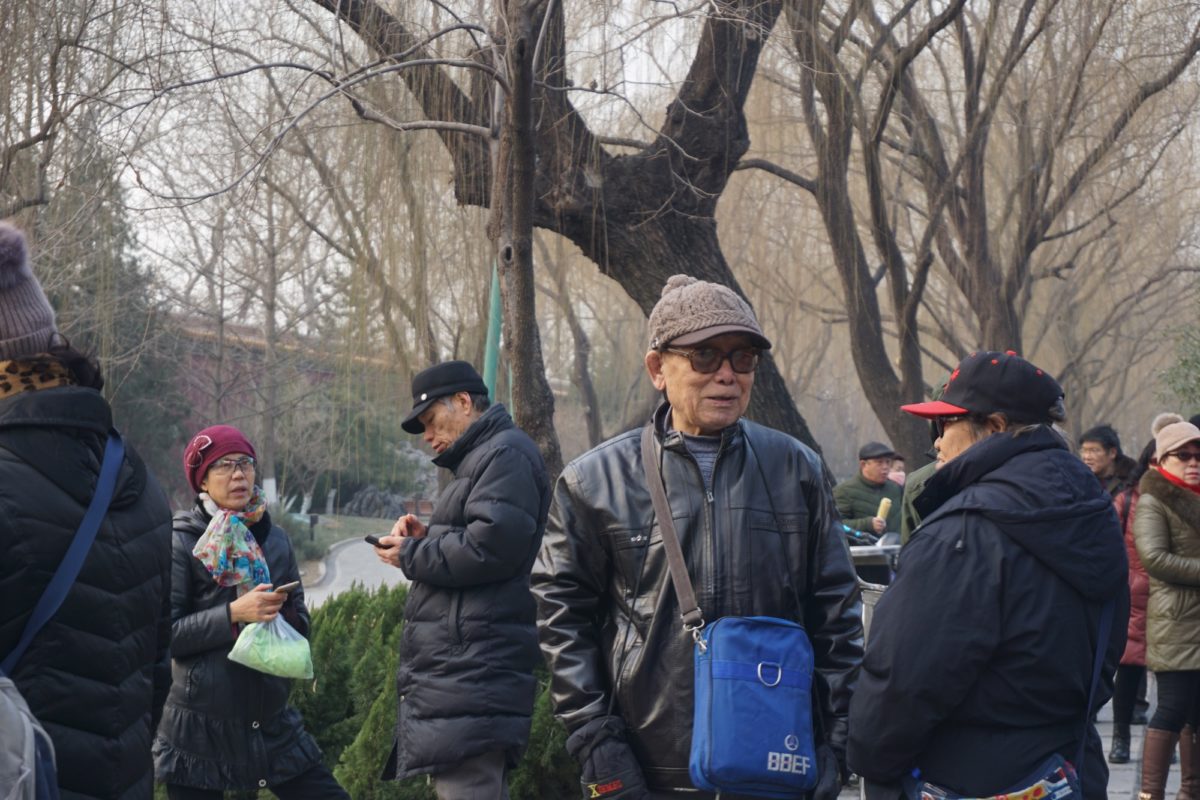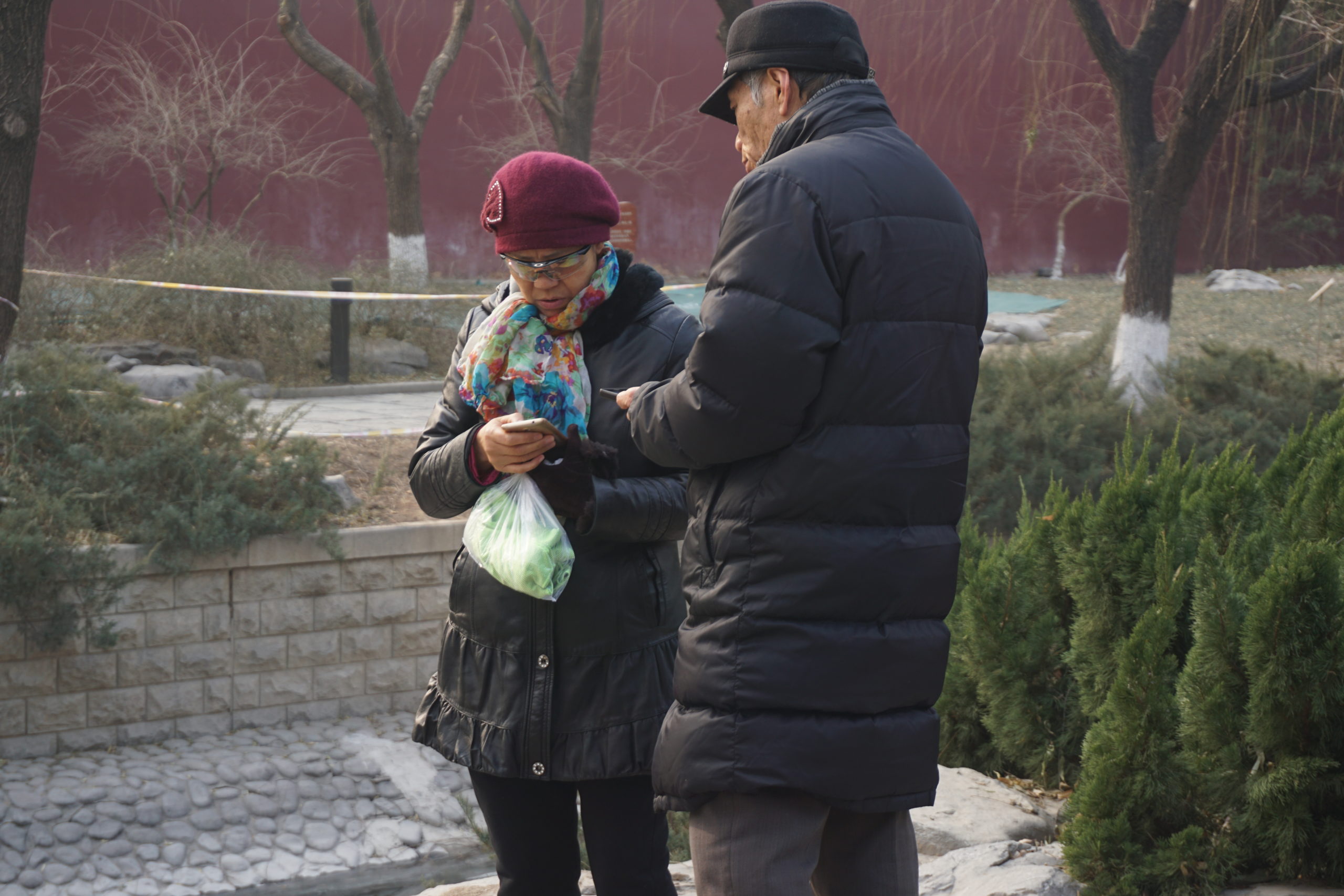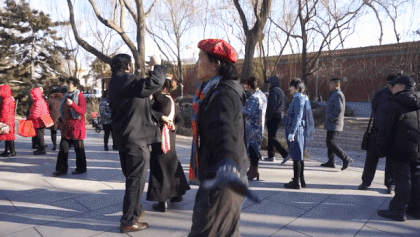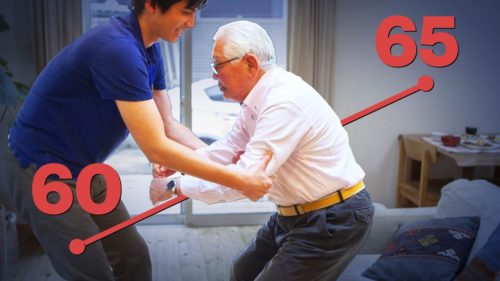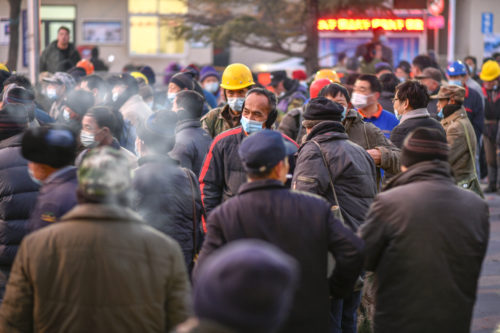In Beijing, two parks where the old and single look to mingle
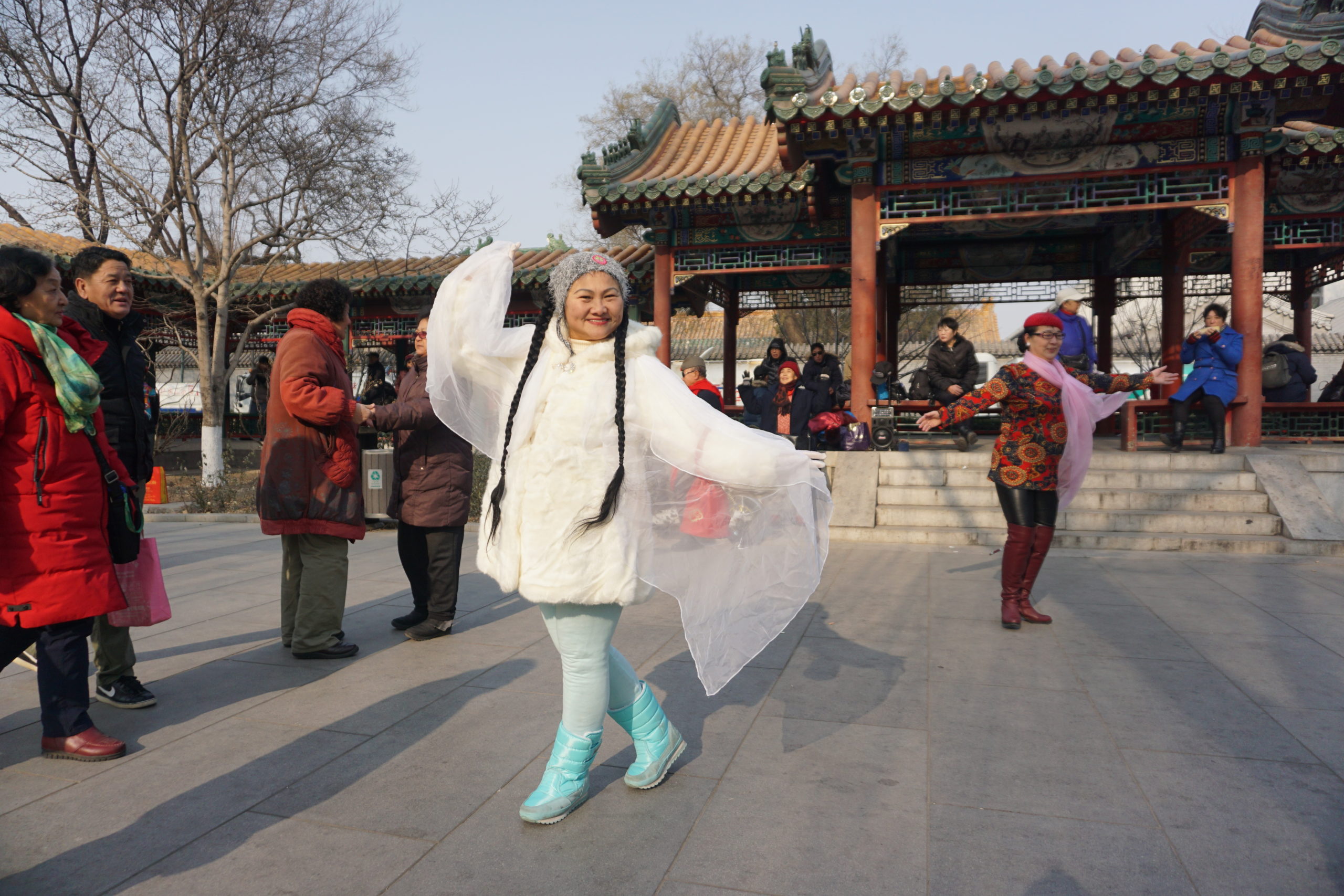
In China, more than 43 million seniors are widowed, divorced, or unmarried.
In Beijing, you’ll find many of them at Changpu River Park and Tiantan Park, where they seek their “second spring.”
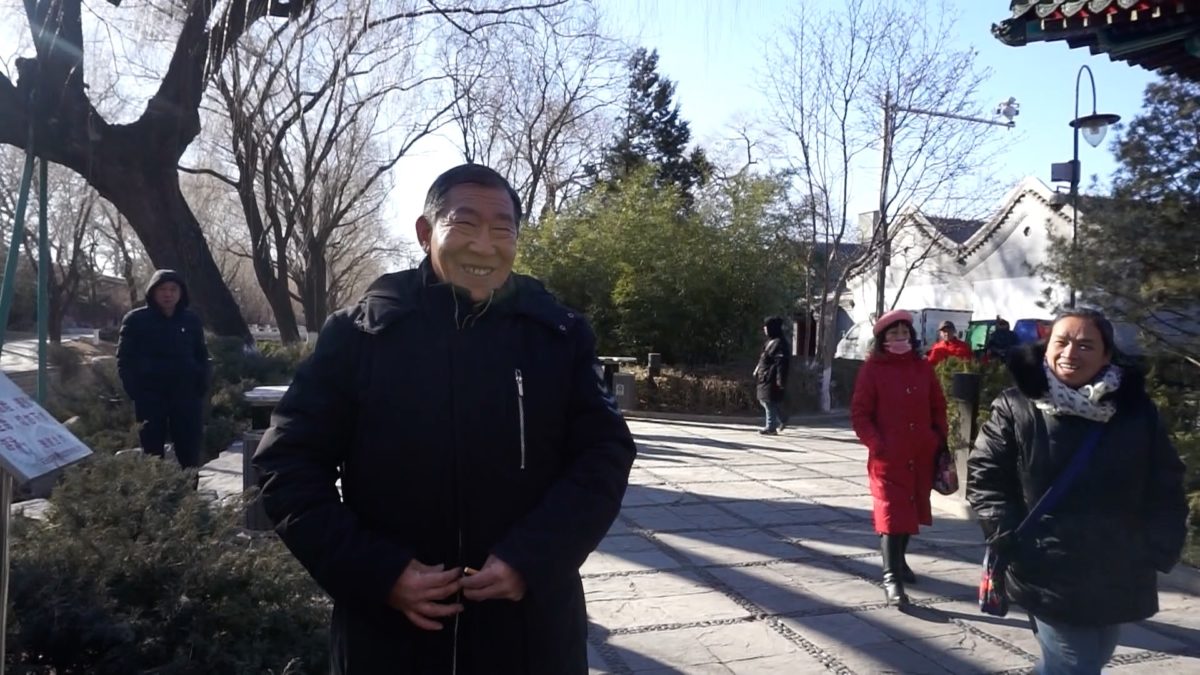
For those on the inside, like Wang Hanjun, the days and locations are common knowledge. At Changpu River Park (菖蒲河公园 chāngpú hé gōngyuán), a small strip of greenery close to the Forbidden City, it’s Tuesdays and Saturdays on the side of the park with the veranda. At the Temple of Heaven (Tiantan) Park (天坛公园 tiāntán gōngyuán), it’s Mondays, Wednesdays, Fridays, and Sundays, by the east gate.
Wang, with his thin face and silver-streaked hair, stands slightly off to the side on a cold Saturday in early February. He watches as small groups form and dissolve, as conversations build up and fade away. Off to his right, in what passes for a plaza in Changpu River Park’s limited space, couples swing and dance away to music that blasts from two large speakers.
Wang, in his mid-60s, is from Luoyang, the largest city in Henan and one of the Four Great Ancient Capitals of China. His thick Henan accent is immediately noticeable, and he has a habit of letting his gaze wander and shift as he speaks. Maybe the habit is natural, or maybe it’s something he picked up while spending time at Changpu River or the Temple of Heaven on certain days of the week. Because he’s here a lot.
And like the others who are here — the swing-dancers, the casual conversationalists, the quiet observers — Wang wants to see if maybe, just maybe, he can find a late-life partner.

It’s unclear when these two public parks became hotspots for the elderly and middle-aged in Beijing seeking their “second spring.” What is for sure, however, is that these scenes developed organically.
Changpu River Park, which opened to the public in 2003, is the larger and more well-known of the two; Tiantan seems to be newer, but nobody at either park can give an exact timeline. Others say Ritan Park on the east side of the city is joining the ranks, but Changpu River’s Tuesdays and Saturdays are still by far the most popular. Word travels by mouth: there are no WeChat groups for these designated days, even in today’s smartphone-saturated world.
It’s possible that the elderly dating scene at Tiantan developed from the marriage market that has been happening inside the park compound for years, in which parents seek partners for their grown children. That still happens — but nearby, seniors also seek for themselves. Occasionally, some even bring printouts of their “resumes,” just as marriage market parents do for their children.
While most elderly singles aren’t as specific in their demands as parents might be for their children — height, weight, car ownership, etc. — their conversations are more or less the same: seekers directly ask, as early on as possible, about each other’s financial situations, marital situations, income or pension, property situations, and whether or not their children, if they have any, are married. These practical elements form a sort of checklist that many feel they need to go through before any real conversation can begin, or affection can flourish.
And these practical elements are important — Wang tells me that calling people “tricksters” or “swindlers” outright might be a little extreme, but that one must be discerning at all times. These are, after all, strangers. “You can see their clothes, judge them by the way they dress. But you can’t tell who they are on the inside through those things,” he says.
China is currently home to the fastest-growing aging population in the world. Experts and officials say approximately 35 percent of the country’s population will be above the age of 60 by 2050. Public and private sectors have mobilized to address this unprecedented aging and the societal disruption it’s likely to cause — and, in fact, is already beginning to cause. In rural areas, where most young people have left to find work in the cities, officials have gone as far as instituting yoga as a community activity for seniors to keep them active and social. In urban areas, the steady influx of retiring individuals means that the elderly make up a substantial portion of those who participate in communal activities, such as plaza dancing (广场舞 guǎngchǎng wǔ). Many urban residents have long considered plaza dancing a nuisance, citing noise pollution and public disturbance — enough to warrant throwing bags of feces at these “dancing grannies.”
Zhanlian Feng, a gerontologist and social demographer with RTI International and Brown University, researches elderly care in China. He tells me over the phone that underlying this phenomena — these dating parks, the plaza dancing, the community yoga — is something much more pervasive and simpler: loneliness.
“It’s serious stuff,” he says, and refers to the UK’s 2018 appointment of a Minister of Loneliness, as British lawmakers agreed that loneliness was an “epidemic” in English society, especially targeting those aged 50 and over. Surveys have found that widowers, many of them in this older age range, were five times more likely to report loneliness than their peers in relationships. The decision for this appointment also recognized that loneliness is more than simply a mental or emotional ailment, but one that directly leads to physical health problems.
“People are the same everywhere,” Feng says, while recognizing that understanding the particularities of Chinese social history is necessary to understanding the emergence of park dating scenes.
Feng notes that many couples of China’s current generation of seniors didn’t necessarily marry out of love. “Back in their day — back 30 to 40 years ago — that wasn’t the era of romantic love,” he says. “It was a very practical time. Often the stated reason for staying together, despite the unhappiness they felt, was for the wellbeing of their children — a very familiar narrative.
“So you wonder how the divorce rate is going up, even for people in their 60s or early 70s; you wonder, what’s happening at that age?”
Indeed, studies have found that the decade immediately after retirement is an incredibly tense one for couples, and often ends in divorce. In 2015, China Daily reported that divorce lawsuits for the 60-70 age group in Beijing accounted for nearly 45 percent of all the divorce lawsuits in the city.
And then, they just might find themselves at Changpu or Tiantan.
But it’s not exactly fun and games. Wang, a late-life divorcee, tells me it’s incredibly difficult to date at his age. In addition to practical concerns, it’s especially harder for him, an outsider who doesn’t have a Beijing residency permit (hukou).
Wang says that based on his observations, the majority of the parks’ frequenters are outsiders like him. “Why would old Beijing daye and dama” — slang for “gramps” and “aunties” — “need to come here?” he chuckles, implying that native Beijingers have their own social networks.
He’s not entirely accurate in his evaluation, however. One native Beijinger, whose surname is Zhang, grew up in Xicheng District, the west side of Beijing. In his early 60s, Zhang warns me about the darker side of dating at his age.
“To be frank with you, honest people are few and far between,” he says. (Maybe because of this, the majority of those who frequent the parks were unwilling to give out their full names to me — Wang being one of the exceptions.)
“Everyone just wants money,” Zhang continues. “I mean, I tell people that my pension is 4,000 [yuan per month, or about $580], and they all say, you’re not stable enough…I have money, and I don’t feel lacking in any way, because what I’m supposed to give to my kids, I’ve given…I’m an honest person.”
But not everyone else is, he adds, shaking his head. He and a few of his friends begin rattling off stories of people they know from the parks: people who have been swindled out of thousands of dollars, people whose property deeds are now uncertain…and they keep blaming women.
In a feature on Changpu River Park last December, the website 163.com discussed how gender is central to understanding elderly dating, citing one example of how a group of brightly dressed, divorced, late- to middle-aged women arrived at the park that winter, causing a stir among the regulars. Some were eager to engage with the newcomers. Others, however, immediately called this a “new group of liars.”
The most familiar fraudster in the park — so the narrative goes — is the divorced out-of-town woman in her 50s or 60s seeking an older Beijing husband for hukou reasons and hoping to inherit the man’s urban real estate. Not only is Beijing real estate highly sought, as housing prices have risen astronomically in recent years, but acquiring a city hukou allows access to the full range of public benefits provided for the city’s legal residents.
These benefits include, for example, prioritized healthcare. Retired city residents receive almost complete funding for medical expenses, whereas those with a provincial hukou are only eligible for partial reimbursements. “Can people our age not start having health problems?” Zhang asks, laughing sadly. “I want to find a wife who is a Beijinger like me. Someone in her 50s, preferably, whose children are also married, someone who can live with me — and make a world out of just the two of us — that would be great.” His eyes gleam as he adds: “See, if your kids are married, but the woman you meet, her kids aren’t married, can you just not care about it? If you don’t show concern over it, the two of you will fight. It complicates so many things.”
Zhang points to an older man in his 70s, deaf in one ear, as an example of someone who was “swindled.” The older man hasn’t really told anyone what happened, but Zhang notes that he’s dated “many beautiful, younger women” at the parks.
But how often do fraudulent marriages happen? As it turns out, any kind of marriage resulting from park dating is rare. Success here means finding a loyal and loving lǎobàn’r (老伴儿) — partner — with whom to grow old with.
Zhang thinks for a moment about the successes he’s witnessed. “Very, very, very few,” he says. “Maybe, like, one percent?”
Even so, Changpu River and Tiantan parks continue to attract newcomers as well as regulars. Why?
China’s most recent census, taken in 2010, reports that more than 43 million individuals over the age of 65 in the country were widowed, divorced, or unmarried — a number that is surely even higher today, almost a decade later. And in 2015, the China Academy of Social Sciences found that, across the nation, approximately 80 percent of elderly singles hope to remarry — a number that speaks to the motivating power of loneliness.
Many park frequenters also feel that there is no other way — that coming here at least gives them a measure of freedom while not being in their children’s hair. This is a generation that isn’t known to be tech-savvy or familiar with dating apps.
“At that age, in their 60s, these elderly [at the parks] are not like young people out of college,” says Feng, the gerontologist and social demographer. “Everybody has their own children, their own property, and [concerns with] how to handle all those things. What if they do get remarried, and then the relationship doesn’t pan out well? All those legal things — property, wealth, money — interact to create some complex concerns. That’s the practical side of [all this].”
Wang Hanjun knows that, too. He lights a cigarette and moves to stand closer to a nearby trash can. After an excitement-filled but ultimately unsuccessful Saturday at Changpu River Park — no new phone numbers, no dates set up for the coming week — he’ll try his luck tomorrow at Tiantan.

